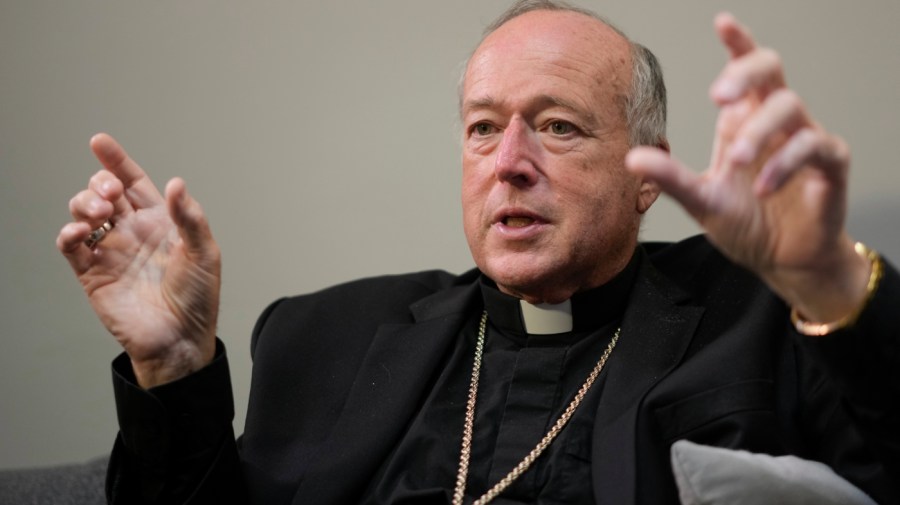
On the day Congress certified Donald Trump’s 2024 election as president, Pope Francis named Cardinal Robert W. McElroy to become the new archbishop of Washington, D.C. It was a historic and well-timed appointment.
During the Biden years, there was an unusual closeness between the president and the Pope. In one of his final acts, Joe Biden bestowed on Pope Francis the Presidential Medal of Freedom calling him “the People’s Pope.” In his citation, Biden lauded the pontiff for being a “loving pastor” whose mission of “serving the poor has never ceased.”
But the fraternal relations between Washington and the Vatican are about to undergo a difficult test.
Donald Trump has nominated Brian Burch, an outspoken critic of Pope Francis, as the new U.S. ambassador to the Vatican. Burch, a Catholic activist, has criticized the Pope’s treatment of his critics and mocked his “progressive Catholic cheerleading.”
The selection of Robert W. McElroy to become the new archbishop of Washington, D.C., highlights Pope Francis’s call that “All are invited. Everyone inside.” For Cardinal McElroy “everyone” means the “radical inclusion” of gay and divorced and remarried Catholics in the life of the Catholic Church, as well as support for including women in the diaconate.
Cardinal McElroy’s emphasis on these issues sets him apart from the U.S. Conference of Catholic Bishops and their call for abortion to be the “preeminent priority” of Catholic leaders. McElroy has questioned why greater prominence is not given to other issues such as racism, poverty, immigration and climate change.
Emphasizing that Catholics should “never be afraid to speak the truth,” Cardinal McElroy summarized his approach to these and other issues as “see, judge, act.”
But McElroy’s appointment goes far beyond Pope Francis’s aim of realigning the U.S. Catholic Church more closely with the goals of his papacy. With Donald Trump once again assuming power, McElroy and Trump are on a collision course when it comes to immigration, the environment and foreign policy.
Massimo Faggioli, a Catholic theologian at Villanova University, says the McElroy appointment represents a “high-profile response to the [current] political situation in America.”
At a press conference announcing his appointment, McElroy called plans for a “wider, indiscriminate, massive deportation” of undocumented immigrants “incompatible with Catholic doctrine.”
This is not a new position for McElroy, whose San Diego diocese shares a border with Mexico. In a 2016 speech, McElroy decried Donald Trump’s deportation plans aimed at undocumented immigrants as “an act of injustice which would stain our national honor in the same manner as the progressive dispossessions of the Native American people of the United States and the internment of the Japanese.”
His criticisms of Trump became even more virulent after that.
In 2017, McElroy delivered a fiery speech calling upon community organizers to “disrupt those who would seek to send troops into our streets to deport the undocumented,” to “disrupt those who train us to see Muslim men and women and children as sources of fear rather than as children of God,” to “disrupt those who seek to rob our medical care,” and to “disrupt those who would take even food stamps and nutrition assistance from the mouths of children.”
McElroy’s outspokenness has prompted criticism among some.
Springfield, Illinois Bishop Thomas Paprocki, a conservative both politically and theologically, has criticized McElroy’s approach to gay and divorced and remarried Catholics, suggesting his views border on heresy.
Luigi Cassalini of the Messa in Latino (Latin Mass) wrote that the selection of McElroy was a “terrible appointment” and “feels like a childish revenge” for Trump’s naming of Brian Burch as U.S. ambassador to the Vatican.
But Cardinal McElroy is uniquely qualified to lead the Washington, D.C., archdiocese. He holds a Ph.D. in Political Science from Stanford University. And as a political scientist and Catholic leader, McElroy has spoken out on what he calls the “profound sickness in the soul of American political life,” stating, “Our political society has been poisoned by a tribalism that is sapping our energy as a people and endangering our democracy.”
According to McElroy when partisanship ceases to be a political category and becomes a form of personal identity, it has “searing negative impacts within families, friendships, and civic life, as citizens increasingly confine themselves within partisan media and culture silos and are encouraged in their anger against those who disagree.”
This is a radical rethinking of the role of political parties in American society. When he assumes the leadership of the Washington, D.C. archdiocese on March 11, 2025, McElroy will not only be a powerful voice for justice but a leader in upending how Catholics should rethink their relationships with one another and the responsibilities enjoined upon them by the duties of citizenship.
One place to start is with the Catholic members of Congress.
A recent Pew study found that there are 150 Catholic members of the 119th Congress — 83 Democrats and 67 Republicans. In his 1989 book, “The Search for an American Public Theology,” McElroy wrote that the political institutions of American life were “increasingly alienated from their spiritual roots.” He is now in a unique position to restore that connection with his new congressional constituents.
The appointment of Cardinal McElroy makes one thing clear: The voice of the Vatican is going to be heard loud and clear in Washington. Trump would be wise to listen.
John Kenneth White is a professor emeritus at the Catholic University of America. His latest book is titled “Grand Old Unraveling: The Republican Party, Donald Trump, and the Rise of Authoritarianism.”

